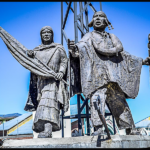Quote:
I will die, but I will return and I will be millions.
Source:
Quoted by Thomas Guthmann (2017): Körper im Zeichen des Zeitstrahls. In glokal: Connecting the Dots. Lernen aus Geschichte(n) zu Unterdrückung und Widerstand, p. 98
Author Bio:
Tupac Katari (1750-1781) was an Aymara leader in the rebellion against Spanish colonisers in present-day Bolivia. He took the names of earlier resistance fighters (Tomás Katari and Túpac Amaru) who were killed by the Spanish in 1572.
Context:
 Tupac Katari assembled an army of 40,000 fighters and besieged La Paz. His wife, Bartolina Sisa, commanded the siege and played an important role after Katari's capture. However, the overthrow of European colonialism in most Latin American countries in the 19th century did not mean that free and equal societies could develop. This was because the formal end of European colonialism did not mean the end of power relations. New hierarchies were created, and the distribution of wealth in many countries was tied to class, race and gender. Aníbal Quijano argued that global capitalism replaced colonialism as the system of domination and that the main beneficiaries of this system continued to be Europeans and their descendants in other countries (Quijano 2007: 168). Tupac Katari's remarks were taken up again in 2003 when the people of Bolivia opposed the sell off of their natural gas. ‘When neoliberal President Sanchez de Lozada was ousted from the presidency, the slogan echoed through the streets of El Alto’ (Guthmann 2017: 98). Former Bolivian President Evo Morales also sees himself as an inheritor of Tupac Katari’s tradition of resistance (Morales' inaugural speech reported in the New York Times, 23 January, 2006).
Tupac Katari assembled an army of 40,000 fighters and besieged La Paz. His wife, Bartolina Sisa, commanded the siege and played an important role after Katari's capture. However, the overthrow of European colonialism in most Latin American countries in the 19th century did not mean that free and equal societies could develop. This was because the formal end of European colonialism did not mean the end of power relations. New hierarchies were created, and the distribution of wealth in many countries was tied to class, race and gender. Aníbal Quijano argued that global capitalism replaced colonialism as the system of domination and that the main beneficiaries of this system continued to be Europeans and their descendants in other countries (Quijano 2007: 168). Tupac Katari's remarks were taken up again in 2003 when the people of Bolivia opposed the sell off of their natural gas. ‘When neoliberal President Sanchez de Lozada was ousted from the presidency, the slogan echoed through the streets of El Alto’ (Guthmann 2017: 98). Former Bolivian President Evo Morales also sees himself as an inheritor of Tupac Katari’s tradition of resistance (Morales' inaugural speech reported in the New York Times, 23 January, 2006).Further Reading:
*Thomas Guthmann (2017): Körper im Zeichen des Zeitstrahls. In glokal: Connecting the Dots. Lernen aus Geschichte(n) zu Unterdrückung und Widerstand.
*Anibal Quihano (2007): Coloniality and Modernity/Rationality, Cultural Studies 21 (2-3); 168-178.
**The New York Times (23.01.2006): “Bolivia Indians Hail the Swearing In of One of Their Own as President.”
Year:
1781